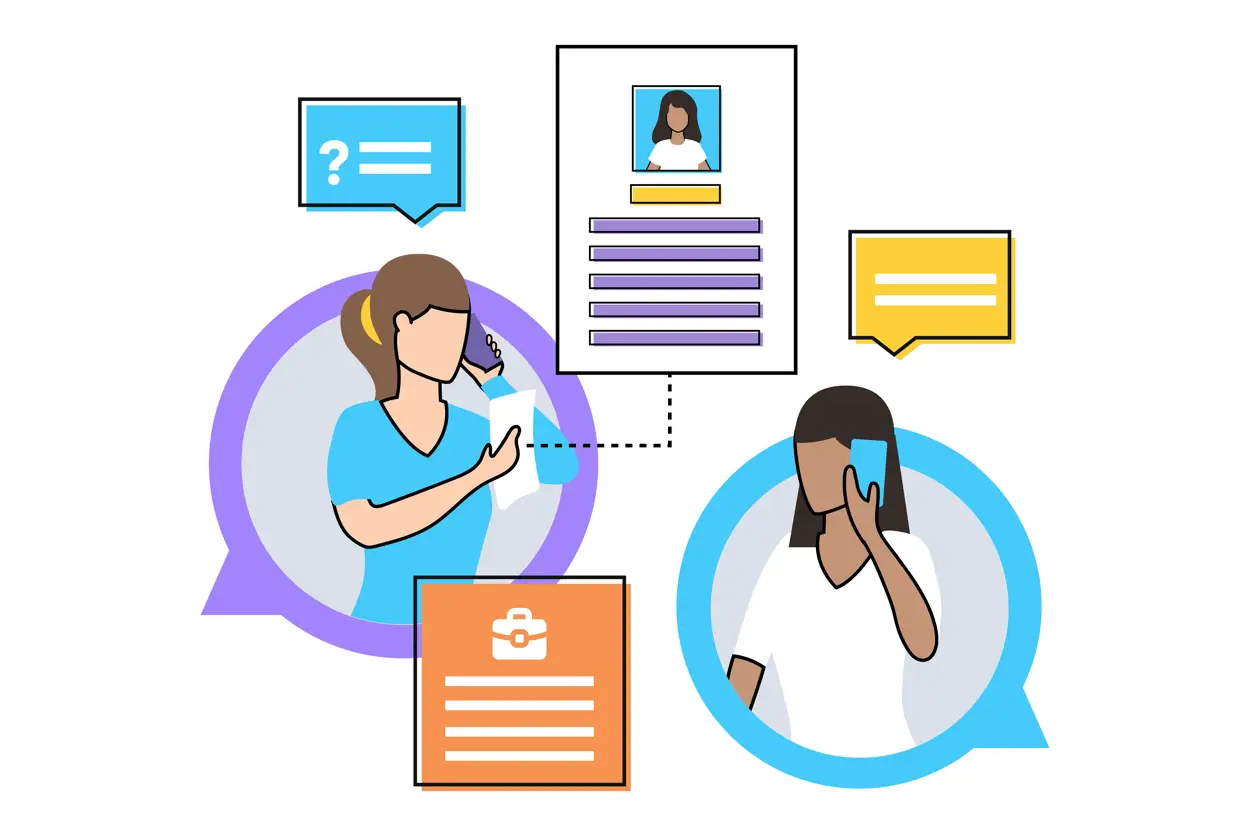The Ultimate Guide to Conducting Effective Phone Interviews
Phone interviews play a pivotal role in the hiring process, serving dual purposes of assessing a candidate's suitability for an onsite interview and establishing a rapport with them. To ensure a seamless and effective recruitment process, it is crucial to optimize phone interviews. In this comprehensive guide, we will provide you with expert tips and strategies for conducting successful phone interviews.
Covering everything from establishing a structured interview process to gathering internal feedback, this guide from Anidaywill equip you with all the necessary tools to maximize the impact of your phone interviews.
Section 1: Building a Structured Interview Process

Before conducting a phone interview, it is vital to establish a structured interview process. This guarantees a uniform and impartial assessment of all candidates. Here are some guidelines to assist you in constructing a well-organized interview process:
Tip 1: Hold a Kickoff Meeting
Convene a kickoff meeting with your hiring manager to identify the essential skills and values sought in a candidate. Utilize this insight to formulate a standardized set of questions to be posed by each interviewer during the phone interview. This methodology guarantees that all candidates undergo evaluation against identical criteria.
Tip 2: Create a Question Bank
Create a comprehensive question bank that covers a wide range of topics relevant to the role. This will help interviewers stay focused and ensure that all important aspects are addressed during the phone interview. Having a question bank also provides consistency across different interviews.
Tip 3: Evaluate Candidates on Key Criteria
During the phone interview, make sure to evaluate candidates on the key criteria established in the kickoff meeting. This will help you identify the most qualified candidates and narrow down your selection process.
Section 2: Scheduling Phone Interviews

Scheduling phone interviews can sometimes be challenging, especially when candidates have busy schedules. Here are some tips to help you schedule phone interviews effectively:
Tip 1: Be Flexible with Scheduling
When scheduling phone interviews, ask candidates for their availability first. Try to accommodate their preferred time slots, even if it means scheduling interviews during lunch hours or outside of regular business hours. Being flexible shows respect for the candidate's time and availability.
Tip 2: Offer Alternatives to Phone Interviews
If a high-caliber candidate hesitates to participate in the traditional phone interview, provide alternatives such as a brief phone call or a meeting with the hiring manager for coffee. This approach enables candidates to connect with someone who understands their perspective, potentially enhancing their willingness to engage in the interview process.
Tip 3: Communicate Clearly
Clearly communicate the date, time, and duration of the phone interview to the candidate. Provide any necessary instructions or materials in advance to ensure a smooth interview experience.
Section 3: Interviewer Preparation

Proper preparation is essential for interviewers to conduct effective phone interviews. Here are some tips to help interviewers prepare:
Tip 1: Review Candidate's Resume and Job Description
Prior to each phone interview, interviewers should thoroughly review the candidate's resume, job description, and any pertinent materials. This preparation guarantees that interviewers have a comprehensive understanding of the candidate's background and qualifications.
Tip 2: Familiarize Yourself with Interview Questions
Become familiar with the interview questions in advance. This will allow interviewers to ask questions confidently and stay on track during the phone interview.
Tip 3: Create a Comfortable Environment
Find a quiet and distraction-free environment to conduct the phone interview. This will help interviewers focus on the conversation and create a positive impression on the candidate.
Section 4: Learning Candidate Motivations
The phone interview is an excellent opportunity to learn about candidates' motivations for considering a new role. Understanding their motivations can help you sell your opportunity throughout the recruitment process. Here are some tips to uncover candidate motivations:
Tip 1: Ask Open-Ended Questions
Ask open-ended questions that encourage candidates to share their motivations, career goals, and aspirations. This will give you valuable insights into their reasons for seeking a new role.
Tip 2: Listen Attentively
Pay close attention to candidates' responses and listen for any clues about their motivations. Take notes and refer back to them during subsequent stages of the recruitment process.
Tip 3: Align Motivations with Company Values
Pay attention to the questions candidates pose, as they can offer valuable insights into their interests and priorities. Gaining an understanding of these focal points can assist you in customizing your recruitment process to align with their needs.
Section 5: Allowing Candidate Questions
Just as you are screening candidates, candidates are also evaluating your organization. Allowing candidates to ask questions during the phone interview is crucial for assessing mutual fit. Here are some tips for facilitating candidate questions:
Tip 1: Encourage Questions Throughout the Interview
Encourage candidates to ask questions throughout the phone interview. This demonstrates that you value their input and shows them that you are interested in addressing their concerns.
Tip 2: Provide Ample Time for Questions
Allocate dedicated time at the end of the phone interview for candidates to ask any remaining questions. This ensures that candidates have all the information they need to make an informed decision about pursuing the opportunity further.
Tip 3: Pay Attention to Candidate Interests
Take note of the questions candidates ask, as they can provide valuable insights into their interests and priorities. Understanding these areas of focus can help you tailor your recruitment process to meet their needs.
Section 6: Providing Next Steps
At the end of the phone interview, it is crucial to provide candidates with clear information about the next steps in the recruitment process. Here are some tips for providing next steps:
Tip 1: Communicate the Recruitment Process
Outline the remaining steps in the recruitment process and provide an estimated timeline for each stage. This sets clear expectations for candidates and keeps them engaged in the process.
Tip 2: Follow Through on Promises
Follow through on any promises made during the phone interview, such as sending additional materials or scheduling follow-up interviews. Consistency and reliability in your actions build trust with candidates.
Tip 3: Keep Candidates Informed
If there are delays or changes to the recruitment process, communicate them promptly to candidates. This demonstrates transparency and professionalism, ensuring that candidates feel respected and informed throughout the process.
Section 7: Gathering Internal Feedback
Gathering internal feedback after each phone interview is crucial for making informed decisions about candidates. Here are some tips for gathering internal feedback effectively:
Tip 1: Allocate Time for Feedback
Block out time immediately after each phone interview for interviewers to provide feedback while it is still fresh in their minds. This ensures that feedback is accurate and relevant.
Tip 2: Standardize Feedback Forms
Create standardized feedback forms or templates to ensure consistency in the feedback provided by different interviewers. This allows for easy comparison and evaluation of candidates.
Tip 3: Involve Hiring Managers
Ensure that hiring managers review the feedback in a timely manner and provide their input. This collaboration helps in making informed decisions about which candidates to move forward in the recruitment process.
Conclusion
Phone interviews are a critical component of the hiring process, helping to identify qualified candidates and build rapport. By following the tips and strategies outlined in this guide, you can conduct effective phone interviews that lead to successful hires.
Remember to create a structured interview process, be flexible with scheduling, prepare interviewers, learn candidate motivations, allow candidate questions, provide clear next steps, and gather internal feedback. With these guides from Aniday, your phone interviews will be optimized for success.
Aniday's HR Services
Headhunting Service
Find and recruit quality candidates in just 1 week! Supported by 40,000 experienced headhunters in IT, Finance, Marketing… capable of recruiting in any region.
Headhunting Service ➔Employer of Record (EOR) Service
On behalf of your business, we recruit employees and handle payroll without the need to establish a company in markets such as Vietnam, Singapore, Malaysia, India, Indonesia…
Employer of Record (EOR) Service ➔